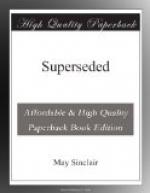Rhoda saw a change in her; Rhoda was never too busy to spare a thought for Miss Quincey. “Yes,” she said, “you are better. Your eyes are brighter.”
“That,” said Miss Quincey, with simple pride “is the arsenic. Dr. Cautley is giving me arsenic.”
Now arsenic (like happiness) has some curious properties. It looks most innocently like sugar, which it is not. A little of it goes a long way and undoubtedly acts as a tonic; a little more may undermine the stoutest constitution, and a little too much of it is a deadly poison and kills you. As yet Miss Quincey had only taken it in microscopic doses. Something had changed her; it may have been happiness, it may have been illusion; whatever it was Miss Quincey thought it was the arsenic—if it was not the weather, the very remarkable weather. For that year Spring came with a burst.
Indeed there is seldom anything shy and tentative, anything obscure and gradual about the approaches of the London Spring. Spring is always in a hurry there, for she knows that she has but a short time before her; she has to make an impression and make it at once; so she works careless of delicacies and shades, relying on broad telling strokes, on strong outlines and stinging contrasts. She is like a clever artist handicapped with her materials. Only a patch of grass, a few trees and the sky; but you wake one morning and the boughs are drawn black and bold against the blue; and leaves are sharp as emeralds against the black; and the grass in the squares and the shrubs in the gardens repeat the same brilliant extravaganza; and it is all very eccentric and beautiful and daring. That is the way of a Cockney Spring, and when you are used to it the charm is undeniable.
One day Miss Quincey walked in Camden Town and noted the singular caprices of the Spring. Strange longings, freaks of the blood and brain, stirred within her at this bursting of the leaf. They led her into Camden Road, into the High Street, to the great shops where the virginal young fashions and the artificial flowers are. At this season Hunter’s window blooms out in blouses of every imaginable colour and texture and form. There was one, a silk one, of so discreet and modest a mauve that you could have called it lavender. To say that it caught Miss Quincey’s eye would be to wrong that maidenly garment. There was nothing blatant, nothing importunate in its behaviour. Gently, imperceptibly, it stole into the field of vision and stood there, delicately alluring. It could afford to wait. It had not even any pattern to speak of, only an indefinable white something, a dice, a diaper, a sprig. It was the sprig that touched her, tempted her.




